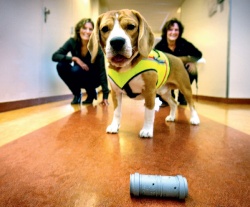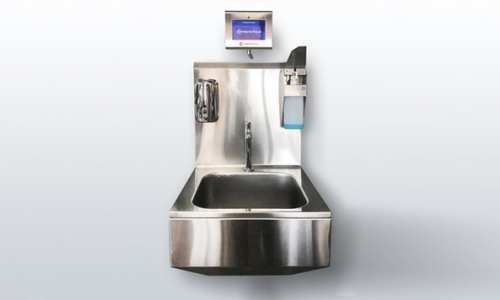The nose knows
Dutch dog demonstrates his talent for sniffing out C. difficile
Cliff, a two-year-old beagle, has recently demonstrated his talent for detecting Clostridium difficile according to doctors at the Vrije University Medical Centre (VUMC) in Amsterdam.


‘A dog’s nose is 300 times more sensitive than a human’s, and in the case of well-trained dogs their sense of smell can be 500- 600 times better than a human’s’, explains Hotsche Luik, professional dog trainer at the Scent Detection Research Academy in Amsterdam. ‘The dogs use their noses in the same way that we humans use our eyes.’ This ability benefits patients in the Amsterdam hospital as Cliff sniffs for C. difficle during regular ward rounds with his trainer Hotsche. Patients’ stool samples are not needed. The dog can identify an infected person from a distance, even if they are lying under a duvet.
Cliff’s biggest advantage is his speed. Whilst a result from a stool sample taken to detect the pathogen takes more than three days, the dog can detect an infected person shortly after entering a patient’s room. Thus, by isolating an infected patient earlier, valuable time can be saved in the avoidance of infection transfer from human to human. C. difficile does not usually present a danger for healthy people. However if, for instance, antibiotics affect the healthy gut flora, bacteria can spread undisturbed. Older patients in particular can then develop symptoms such as fever, nausea and diarrhoea, the latter being very hard to distinguish from ordinary diarrhoea, although one distinctive feature is the smell associated with C. difficile. Cliff was prepared for his new task through conditioning. Based purely on the smell of the bacterium, perhaps picked up in the air from a wooden stick, some fabric, or even if it had been sealed in a plastic container, out in the woods Cliff showed his strengths.
‘After two months, we tested his sense of smell based on 50 positive and 50 negative stool samples. He detected all positive samples and 47 out of 50 negative samples accurately. The sensitivity was therefore 100%, which makes it much higher than that of laboratory tests,’ said Dr Marije Bomers, infection specialist at the VUMC and head of the study, which was published in the British Medical Journal. Cliff also achieved comparatively good results during his first ward rounds six months later. He detected 25 out of 30 infected patients and correctly identified 265 out of 270 negative control subjects.
‘The idea,’ said Dr Bomers, ‘holds great potential, but more research has to be done first to see whether this concept actually works.’ For now, there is hope is that conditioning dogs like Cliff might prove to be an effective and cost efficient screening procedure for C. difficile. in hospitals, with the added positive psychological effect that the presence of animals has been shown to have on in-patients.
01.03.2013





